Orbitly Alternatives
A direct comparison of 10 Orbitly alternatives. We analyze features, pricing, and performance to help you choose the right tool for your team.

You may have used Orbitly for its data enrichment. The tool performs well when you need to find contact information quickly for sales or marketing, which is why many people use it.
However, some users report that data accuracy can be inconsistent and it lacks certain integrations. We analyzed the best alternatives to Orbitly, comparing their pros and cons based on G2 reviews to help you choose. Let's get started.
Consider 11x for Your Sales Team
For sales teams interested in automation, digital workers are an option. 11x provides AI employees to manage tasks such as lead research and outreach. This allows your team to concentrate on closing deals.
You can explore how these AI employees support sales operations and fit into an existing workflow. See how they handle specific functions and what the integration process involves for your team.
11x is a GTM platform where we use AI agents to handle the sales process.
Our AI agent, Alice, finds prospects, runs outreach on email and LinkedIn, and keeps your CRM current. Julian qualifies inbound leads and schedules meetings.
We combine data enrichment, outreach, and email warmup functions, replacing the need for separate point solutions.
Orbitly Alternatives
This section provides a detailed breakdown of Orbitly alternatives. We compare each tool's main features, pricing, and the advantages and drawbacks relative to Orbitly.
1) Apollo.io
Apollo.io is a sales intelligence platform that offers a B2B contact database and sales engagement tools. It combines data enrichment with outreach functions, allowing teams to manage prospecting and communication within a single system.
Its primary advantage is the all-in-one functionality. Teams can find leads and execute outreach campaigns from one platform. This may reduce the need for separate data and sequencing tools, potentially lowering software expenses for your company.
However, some users find that contact information can occasionally be inaccurate or outdated. The platform's extensive features might also require more training for teams used to simpler, single-function tools like Orbitly.
Apollo.io is a suitable option if you want to consolidate your sales tools. It fits well for teams that need both a large data source and built-in engagement features, rather than using separate point solutions.
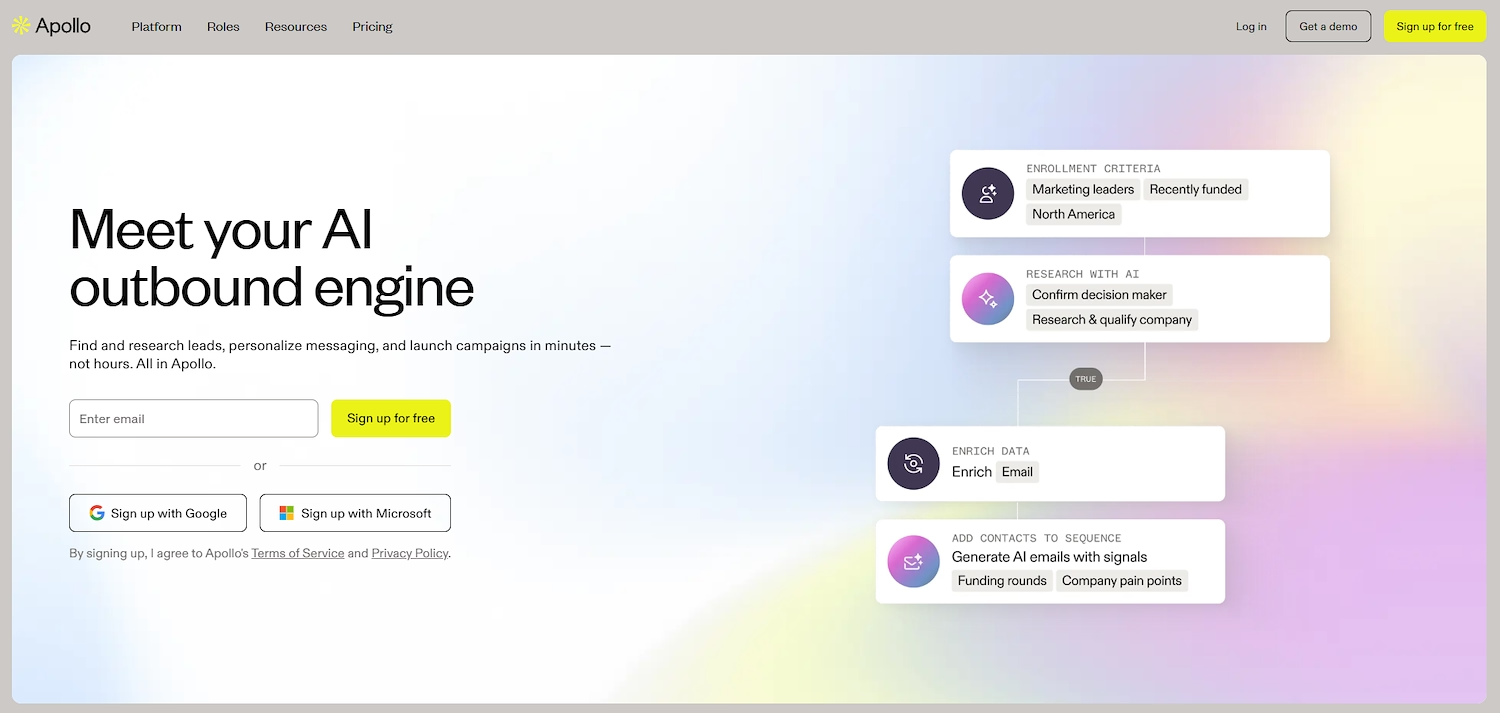
Apollo.io is a sales intelligence platform with a B2B contact database and sales tools. It combines data enrichment with outreach functions so teams manage prospect discovery and communication in one system. This approach can replace separate data tools.
Some users note that contact information can be out of date. The platform's many features may also require a period of adjustment for new teams.
Apollo.io's Main Features
- Executes outreach campaigns using integrated sales engagement tools.
- Combines a B2B contact database, data enrichment, and outreach functions on one platform.
- Manages prospecting and communication workflows within a single system.
How Apollo.io Compares to Orbitly
Average Review score: 4.7/5 stars based on 8,904 G2 reviews.
- Apollo.io combines sales engagement and data enrichment in one platform. This differs from Orbitly, which focuses on data enrichment.
- The tool includes an engagement suite to manage outreach campaigns. This removes the need for a separate outreach tool that you would use with Orbitly.
- Its B2B database has over 210 million contacts. This offers a broader data source for prospecting compared to Orbitly's more focused enrichment function.
- The platform provides lead intelligence and validation. This helps teams qualify leads in one place, a step that requires another tool when using Orbitly.
Potential Downsides of Using Apollo.io
- The platform's complexity can be a drawback for teams that only need data enrichment. Orbitly provides a simpler, single-function tool that requires less onboarding compared to Apollo.io's extensive feature set.
- Some users report that its contact data can be less accurate than a specialized tool. Because Orbitly focuses only on enrichment, it can sometimes provide more precise data for specific lookups.
- Apollo.io's all-in-one model may be excessive for certain use cases. If a team only requires data enrichment, Orbitly offers a more direct solution without the cost of extra features.
Pricing and Cost Considerations
Apollo.io offers a free plan, with paid tiers starting at $49 per user per month. This subscription model for an all-in-one platform can be more cost-effective than combining Orbitly's data-only function with separate sales engagement tools.
2) Clearbit
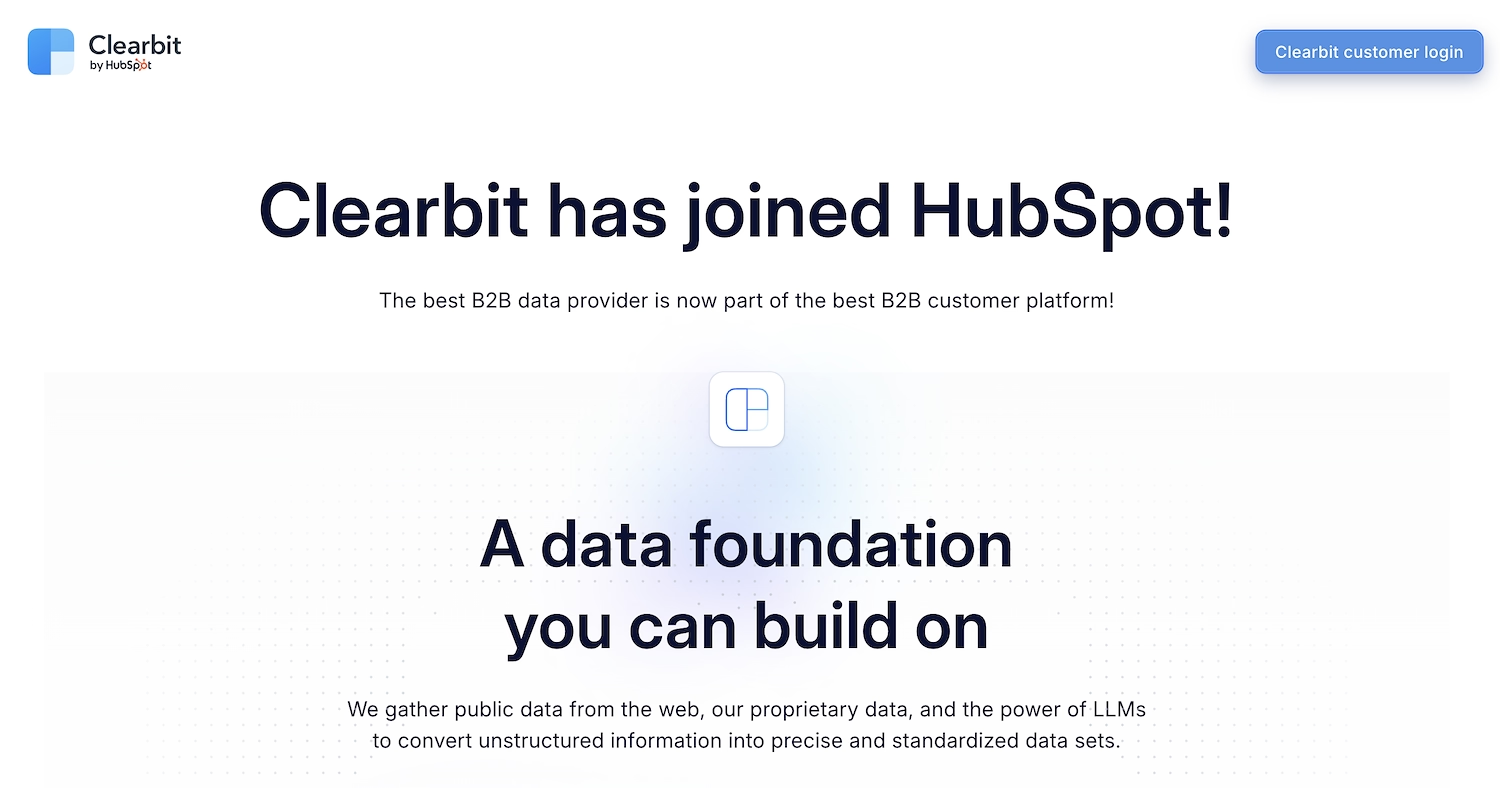
Clearbit, now part of HubSpot, operates as a B2B data provider. It collects public and proprietary data and uses LLM techniques to build standardized datasets. The service provides clean company and contact information to form a data foundation for teams that use HubSpot.
Use cases include the enrichment of CRM records, real-time lead qualification, and the identification of anonymous website visitors who match an ideal customer profile.
Clearbit's Main Features
- Aggregates public web data and proprietary sources with LLM processing to deliver standardized B2B datasets.
- Supplies data for real-time lead scoring and routing, including deep industry classifications and corporate hierarchy mapping.
- Identifies anonymous website traffic to show which visiting companies match an ideal customer profile.
- Removes form fields that can be automatically enriched, which can shorten the lead capture process.
How Clearbit Compares to Orbitly
Average Review score: 4.4/5 stars based on 626 G2 reviews.
- Clearbit identifies anonymous website visitors, a feature Orbitly does not offer. This allows teams to see which companies show interest in their site without a form submission.
- The tool shortens lead capture forms by automatically filling in known information. This can improve conversion rates, whereas Orbitly primarily enriches data after it is captured.
- It provides over 100 data points for each record, including company technology stacks. This offers a more detailed enrichment profile compared to the contact-focused data Orbitly provides.
- As part of HubSpot, Clearbit offers deep integration for automating workflows. This is different from Orbitly, which functions as a separate point solution that requires its own integration setup.
Potential Downsides of Using Clearbit
- Clearbit's pricing model covers a wide suite of features, which can be less cost-effective than Orbitly for teams that only need a simple data enrichment service.
- Its deep integration into HubSpot may present a challenge for companies that do not use that specific CRM. Orbitly, by comparison, is a point solution that connects with a wider variety of tech stacks.
- Some users report that contact data can be outdated. A specialized tool like Orbitly, which focuses solely on enrichment, sometimes provides more current information for specific contacts.
Pricing and Cost Considerations
Clearbit does not provide public pricing, as costs are customized. For accurate pricing information based on your company's needs, we recommend visiting Clearbit's official website.
3) Hunter
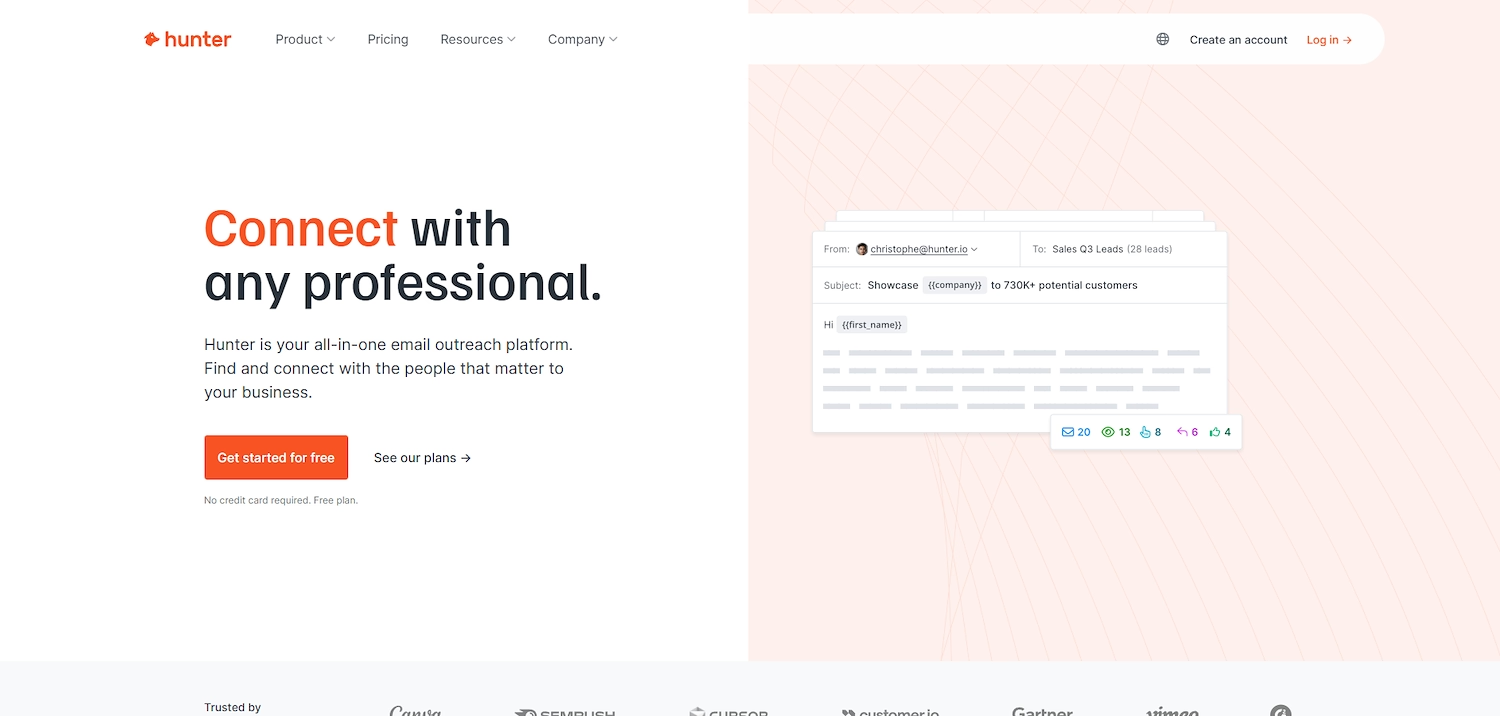
Hunter is an email outreach and lead generation platform. It uses proprietary technology and AI to identify B2B prospects and locate verified email addresses. The service helps businesses build targeted prospect lists and find decision-makers within a company.
Users can verify large email lists to reduce bounces or enrich a CRM with fresh contact data via an API. The platform also supports compliance with data regulations.
Hunter's Main Features
- Finds all publicly available company email addresses from a domain name or URL.
- Composes personalized messages, schedules follow-ups, and views performance analytics with a cold-email suite.
- Lists websites by the technology stack they use to help with targeted prospecting.
- Verifies email lists in bulk to reduce bounce rates and protect sender reputation.
How Hunter Compares to Orbitly
Average Review score: 4.4/5 stars based on 592 G2 reviews.
- Hunter provides a built-in cold email suite to manage outreach campaigns. This differs from Orbitly, which focuses on data enrichment and requires a separate tool to send emails.
- The platform finds all email addresses associated with a specific company domain. This offers a different approach to lead generation compared to Orbitly's function to enrich existing contact data.
- Its bulk email verification service helps clean lists and protect sender reputation. This is a specialized function compared to Orbitly's broader data enrichment for individual records.
- This tool allows users to search for companies based on their technology stack. This provides a targeted prospect search method not available in Orbitly.
Potential Downsides of Using Hunter
- Hunter focuses mainly on email discovery and verification. In comparison, Orbitly sometimes offers a wider range of contact data points for enrichment, which may include details beyond just an email address.
- The platform includes its own outreach campaign tool. This feature might be unnecessary for teams that prefer their existing sales software and only need a simple data enrichment service like Orbitly.
- The tool relies on its own database for searches, which some users find is limited for niche sectors. Orbitly's approach enriches your existing data, which can be more effective for highly specific prospecting.
Pricing and Cost Considerations
Hunter offers a free plan and paid tiers starting at $49 per month. This subscription model, which bundles outreach tools, can be more cost-effective than using Orbitly for data and paying for a separate outreach platform. For detailed pricing, visit Hunter's official website.
4) ZoomInfo SalesOS
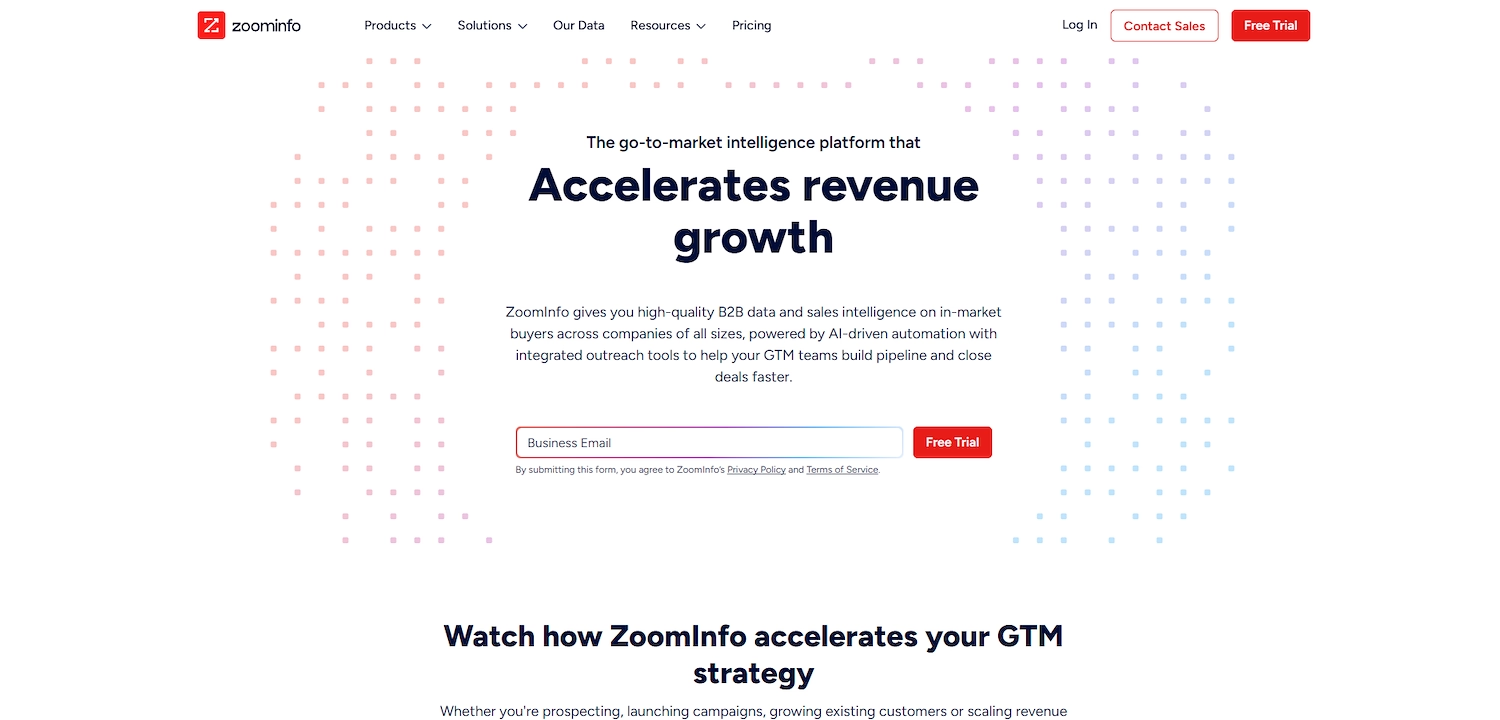
ZoomInfo SalesOS is a go-to-market platform with a large B2B database. It provides verified contact and company data for sales and marketing professionals. The system delivers intelligence on companies and their employees.
Common uses are lead enrichment, sales territory creation, and the identification of purchase intent signals. This data helps teams build prospect lists and inform outreach.
ZoomInfo SalesOS's Main Features
- Identifies ready-to-buy prospects using real-time intent signals.
- Analyzes every call and meeting interaction with conversation intelligence.
- Turns anonymous website visitors into pipeline opportunities.
- Uncovers next-best customers and ideal customer profiles with predictive modeling.
How ZoomInfo SalesOS Compares to Orbitly
Average Review score: 4.5/5 stars based on 8,738 G2 reviews.
- ZoomInfo SalesOS provides buyer intent data to identify prospects who are actively researching solutions. This differs from Orbitly, which primarily enriches contact information you already possess.
- It includes sales engagement tools like an auto dialer and email tracking. This contrasts with Orbitly, which requires separate software for outreach campaigns.
- The platform identifies anonymous companies that visit your website, creating a source of new leads. Orbitly's data enrichment function does not offer this capability.
- This tool offers a large B2B database for prospecting. This provides a broader approach than Orbitly's model, which focuses on enriching specific, user-provided records.
Potential Downsides of Using ZoomInfo SalesOS
- ZoomInfo SalesOS is a comprehensive platform, which can be expensive for teams that only need data enrichment. Orbitly offers a more focused tool that may be a better fit for simpler use cases or smaller budgets.
- The platform's all-in-one model may be less flexible for companies with highly customized tech stacks. Orbitly, as a point solution, sometimes integrates more easily into non-standard systems.
- Some users report that its contact data can be outdated. A specialized tool like Orbitly, which focuses solely on enrichment, can sometimes provide more precise information for specific lookups.
Pricing and Cost Considerations
ZoomInfo SalesOS does not provide public pricing, as costs are customized based on your company's needs. For accurate pricing information, we recommend visiting ZoomInfo SalesOS's official website.
5) Lusha
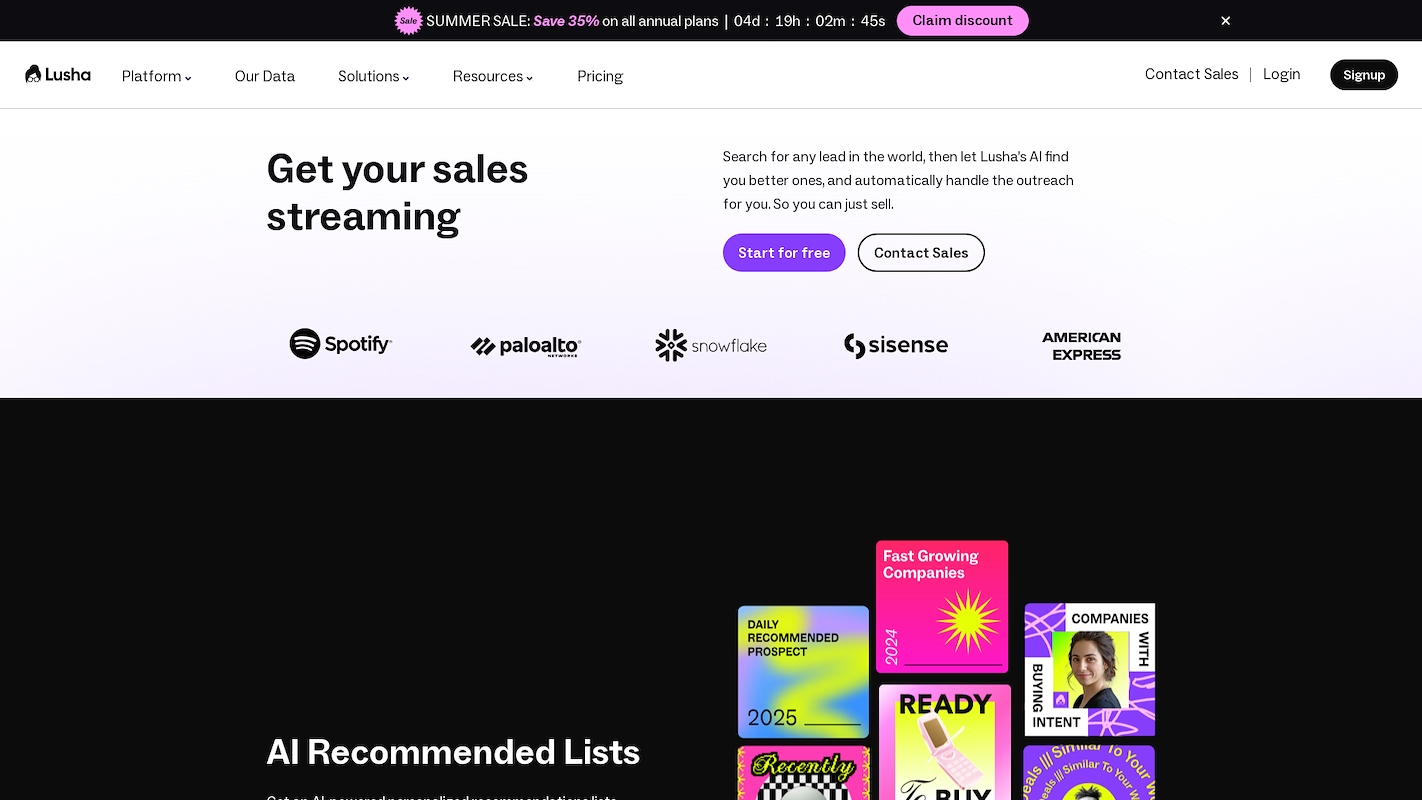
Lusha is a sales intelligence platform that provides B2B contact and company data. It helps sales teams find direct phone numbers and email addresses for prospects. The service supports data enrichment for CRMs and helps build prospect lists.
Common use cases include the identification of decision-makers and outreach preparation. The data allows teams to connect with contacts and support their sales process.
Lusha's Main Features
- Uses an AI-powered search with filters for buyer intent and funding rounds.
- Provides buyer intent data and sends real-time notifications for intent triggers.
- Generates daily, ICP-based prospect lists and live, auto-updating lead lists.
- Records and analyzes sales meetings to provide performance insights.
How Lusha Compares to Orbitly
Average Review score: 4.3/5 stars based on 1,516 G2 reviews.
- Lusha offers buyer intent data with real-time alerts. This helps identify active prospects, a function not present in Orbitly's data enrichment model.
- The tool creates daily, auto-updating prospect lists based on an ideal customer profile. This contrasts with Orbitly, which enriches data for lists you provide manually.
- Its AI-powered search includes filters for details like recent funding rounds. This provides a more targeted way to find new leads compared to Orbitly's contact enrichment function.
- The platform records and analyzes sales meetings for performance insights. This is a conversation intelligence feature that Orbitly, as a data enrichment tool, does not offer.
Potential Downsides of Using Lusha
- Lusha's platform includes many features beyond simple data enrichment. For teams that only need to enrich existing data, Orbitly provides a more focused solution without the cost of extra tools.
- Its credit-based system can be restrictive for high-volume outreach. Some users note the limits on phone number credits, while Orbitly's model may be more flexible for pure enrichment tasks.
- The tool's design as a comprehensive platform may offer less flexibility for custom tech stacks. Orbitly, as a point solution, sometimes integrates more easily into unique or non-standard workflows.
Pricing and Cost Considerations
Lusha offers a free plan and paid tiers starting at $36 per user per month. This bundled approach can be more cost-effective than using Orbitly for data and paying for a separate outreach platform. For detailed pricing, visit Lusha's official website.
Automate Your Sales with 11x
For sales teams that want to automate, 11x provides digital workers for lead research and outreach. This approach lets your team focus on deal closure.
You can explore how these AI employees support sales operations and fit into your current workflow. See how they handle specific functions and what the integration process involves for your team.
With 11x, we use AI to run your sales playbook. Alice finds accounts, enriches their data, and manages outreach, while Julian qualifies inbound leads and schedules meetings. We combine data enrichment, outreach, and email warmup functions, replacing multiple tools in a traditional GTM stack.
Book a demo to see it in action.
6) Snov.io
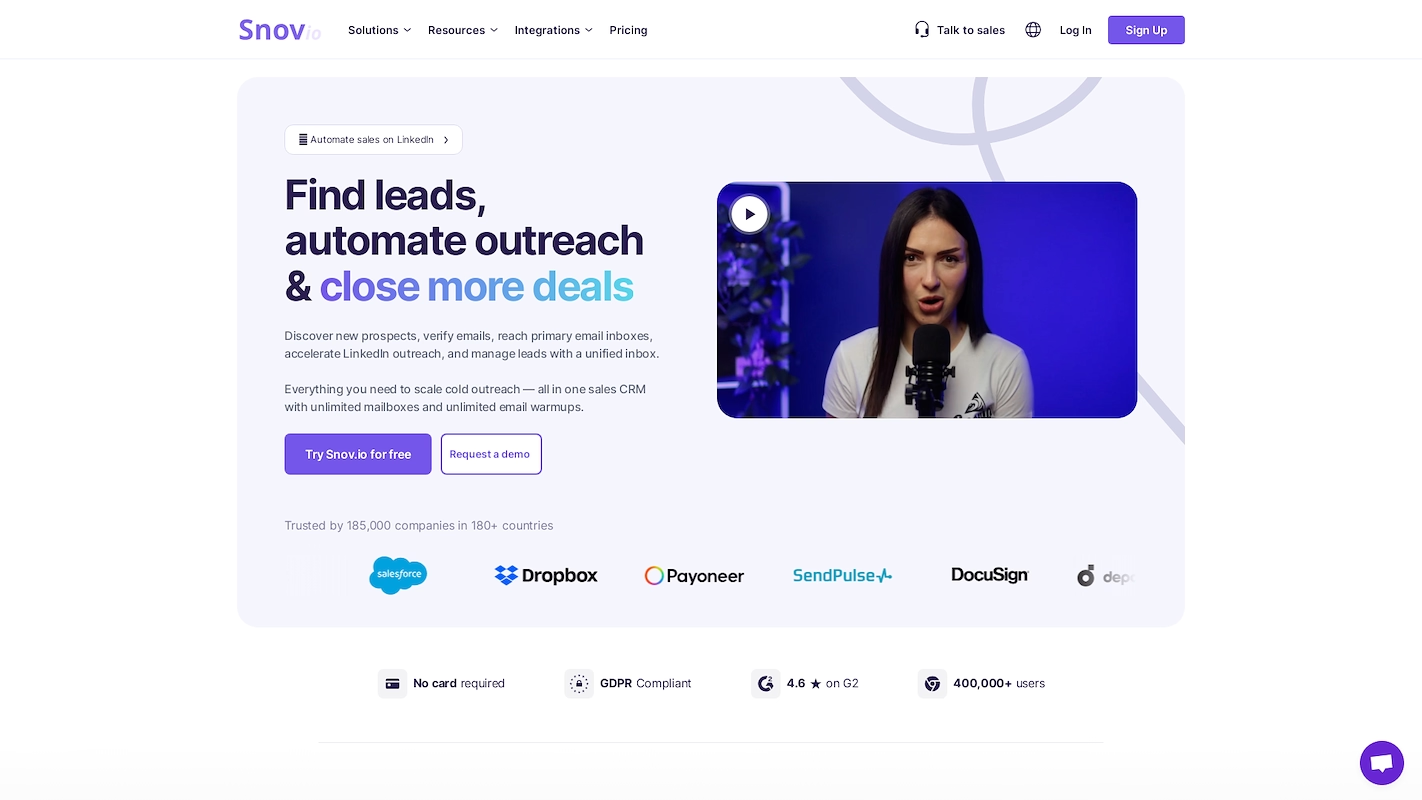
Snov.io is a sales automation platform with tools for lead generation and outreach. It helps users find and verify email addresses and manage automated email campaigns from a single place.
Common uses include the discovery of new prospects and the enrichment of CRM data with fresh contact information. The platform also offers technology to track email opens and link clicks for campaign analysis.
Snov.io's Main Features
- Finds and verifies email addresses using a 7-tier email verifier with 98% accuracy.
- Manages multichannel outreach campaigns and automates LinkedIn actions from a single platform.
- Includes a built-in sales CRM with Google Calendar sync and automated deal stage management.
- Optimizes email deliverability with an automated warm-up tool and domain health checkers.
How Snov.io Compares to Orbitly
Average Review score: 4.6/5 stars based on 450 G2 reviews.
- Snov.io includes a sales CRM to manage the deal pipeline. This differs from Orbitly, which focuses on data enrichment and requires a separate CRM.
- The platform provides an automated email warm-up tool to help deliverability. Orbitly does not offer this function and centers on contact data enrichment.
- It has built-in tools for multichannel outreach campaigns. This is a contrast to Orbitly, where users need a separate platform for sales engagement.
- This tool offers a multi-step email verification process for list cleaning. This is a more specific function than Orbitly's broader data enrichment service.
Potential Downsides of Using Snov.io
- Snov.io includes many features like a CRM and outreach tools. This can be complex for teams that only need a simple data enrichment service, which Orbitly provides.
- The platform focuses on email discovery and verification. Some users report it may provide fewer data points compared to Orbitly, which specializes only in broad contact enrichment.
- Its built-in sales tools might be unnecessary for teams with an existing software stack. Orbitly's function as a point solution can integrate more easily into established workflows.
Pricing and Cost Considerations
Snov.io offers paid plans starting at $39 per month. This bundled pricing can be more cost-effective than using Orbitly for data enrichment and paying for separate outreach and CRM tools. For detailed pricing, visit Snov.io's official website.
7) RocketReach
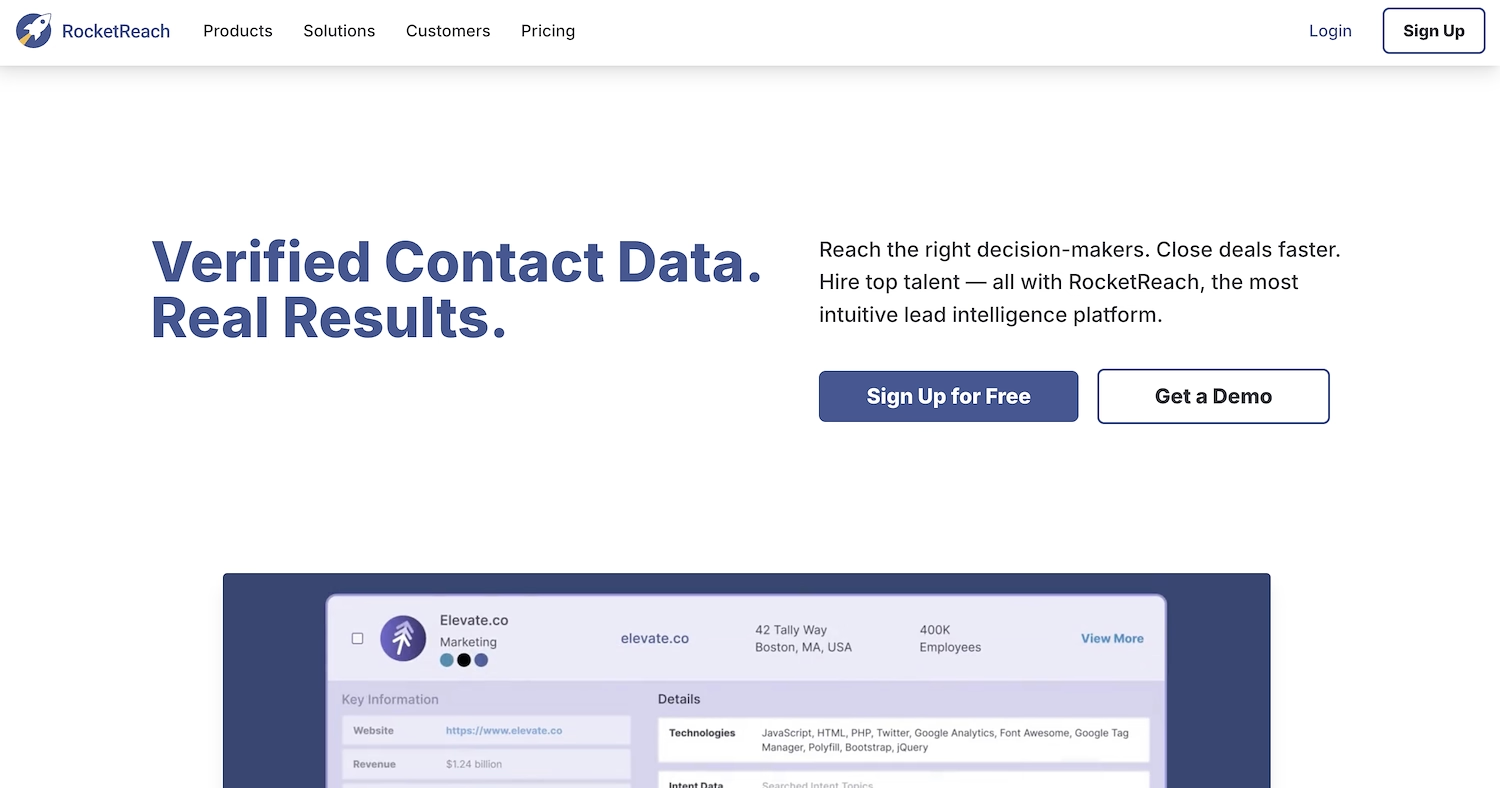
RocketReach is a platform with a database of professional and company profiles. It helps users find contact details like email addresses and phone numbers for individuals.
Sales and recruitment teams use the service to build prospect lists and connect with candidates. The tool also enriches contact records in a CRM with current data.
RocketReach's Main Features
- Accesses a database of professional and company profiles.
- Finds contact details for individuals, including email addresses and phone numbers.
- Builds prospect lists for sales and recruitment teams.
- Enriches contact records in a CRM with current data.
How RocketReach Compares to Orbitly
Average Review score: 4.4/5 stars based on 918 G2 reviews.
- RocketReach offers a searchable database of over 700 million contacts. This differs from Orbitly, which primarily enriches data you already possess.
- Its advanced search capabilities let you build targeted lists, for example, within the healthcare industry. Orbitly, in comparison, works with your pre-existing lists.
- The platform provides intent data to find prospects who are actively researching products. This gives you a source of warm leads, a feature Orbitly does not have.
- It performs bulk lookups to find contact information for many people at once. This is useful for large-scale prospecting, whereas Orbitly focuses on enriching individual records.
Potential Downsides of Using RocketReach
- Some users report that RocketReach's data can be less accurate for specific lookups. In comparison, Orbitly focuses only on enrichment, which may provide more precise data for existing contacts.
- The platform's broad features can be excessive for teams that only need data enrichment. Orbitly provides a simpler tool for this specific task, avoiding the complexity of a large database platform.
- Its pricing model covers a wide range of features, which can be costly for simple enrichment tasks. In contrast, Orbitly's function as a point solution may be more cost-effective if a team does not need a full prospecting database.
Pricing and Cost Considerations
RocketReach offers a free plan, with paid tiers starting at $99 per month for 100 lookups. This subscription model, which covers access to a large contact database, can be more cost-effective than using Orbitly if your team also needs a prospecting tool.
8) LeadIQ
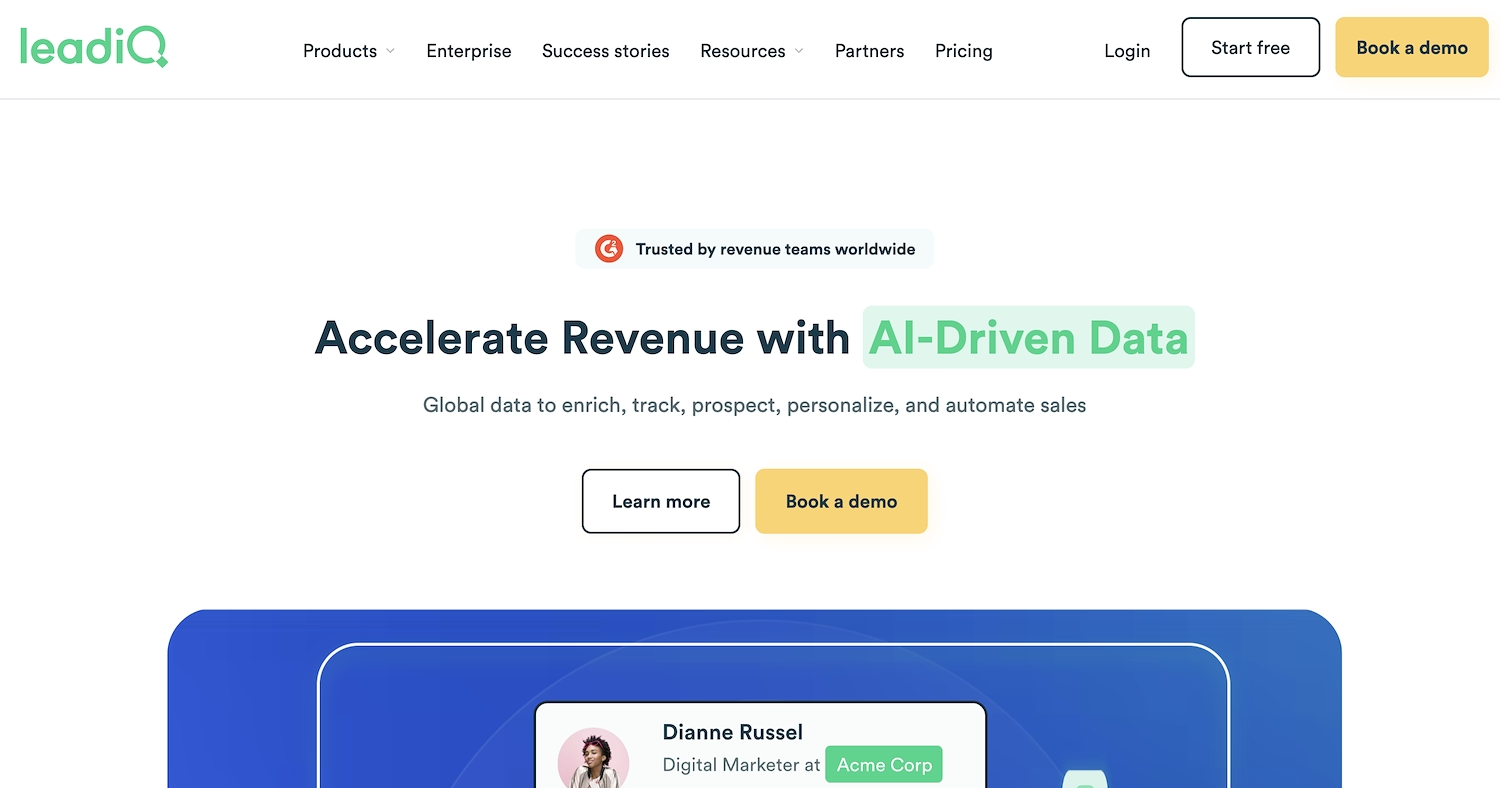
LeadIQ is a sales prospecting platform that helps teams find verified contact information. Sales teams use the tool to capture email addresses and phone numbers from professional networks and company websites. The data then syncs to a CRM, which supports outreach list creation and the enrichment of existing records.
LeadIQ's Main Features
- Builds lead lists using available contact and company data.
- Monitors leads and tracks sales triggers to inform outreach.
- Provides access to industry research for targeted prospecting.
- Integrates with CRM and marketing automation systems to sync data.
How LeadIQ Compares to Orbitly
Average Review score: 4.2/5 stars based on 1,097 G2 reviews.
- LeadIQ tracks sales triggers to inform outreach timing. This is different from Orbitly, which focuses on enriching contact data you already have.
- The platform helps build new lead lists from its own data. In comparison, Orbitly works by adding information to your existing lists.
- It provides access to industry research for more targeted prospecting. This allows for a search-based approach, while Orbitly enriches specific, pre-selected contacts.
- This tool syncs captured data directly to CRM and marketing automation systems. This supports the immediate creation of outreach lists, a step that requires another tool when using Orbitly for enrichment.
Potential Downsides of Using LeadIQ
- LeadIQ focuses on finding new contacts, which sometimes results in limited data for each record. Orbitly, in comparison, specializes in deep enrichment and can provide a wider range of data points for contacts you already have.
- Some users report that its contact data can be less accurate for certain lookups. A tool like Orbitly, which concentrates only on enrichment, may offer more precise information for specific, existing records.
- The platform includes features for building new prospect lists from its database. This might be unnecessary for teams that only need to enrich their current contact data, a task where Orbitly offers a more direct solution.
Pricing and Cost Considerations
LeadIQ offers a free plan, with paid tiers starting at $45 per user per month. This subscription model can be more cost-effective than using Orbitly for data and paying for separate prospecting tools. For teams that only need data enrichment, Orbitly's focused approach may be a less expensive option.
9) Cognism
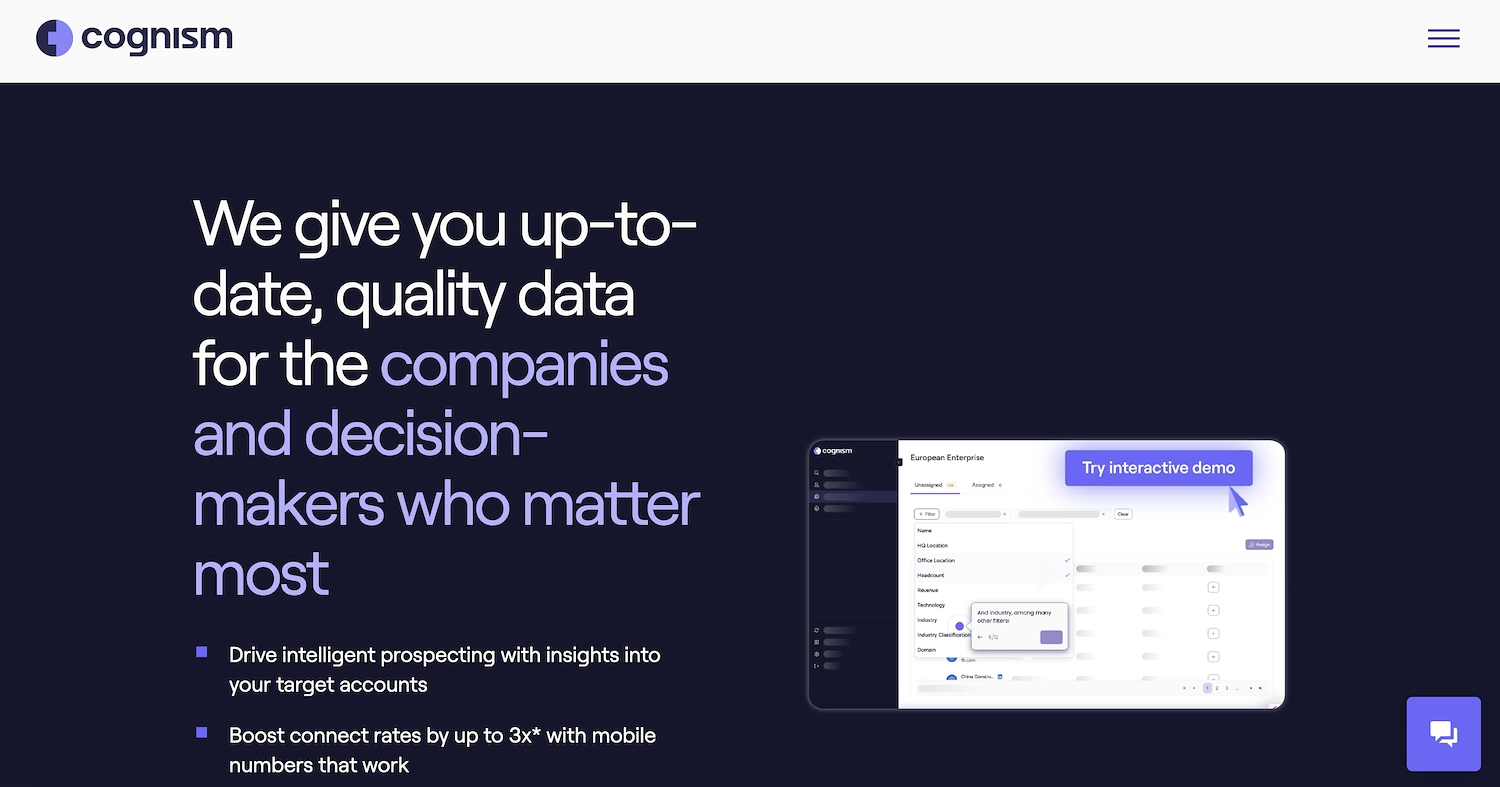
Cognism is a sales intelligence platform that provides contact and company data for B2B teams. The service is used to find information on prospects and accounts. It supports data enrichment for CRMs and helps build lists for sales and marketing outreach.
Cognism's Main Features
- Provides industry research for targeted prospecting.
- Builds lead lists using available contact and company data.
- Delivers lead intelligence to help qualify prospects.
- Integrates with CRM and marketing automation systems to sync data.
How Cognism Compares to Orbitly
Average Review score: 4.6/5 stars based on 1,033 G2 reviews.
- Cognism provides intent data to identify prospects who are actively looking for solutions. This differs from Orbitly, which enriches contact information for lists you already have.
- It allows users to build new prospect lists from its database. In contrast, Orbitly works by adding data points to your existing contacts rather than generating new leads.
- The tool offers GDPR-compliant data with a strong focus on European markets. This provides a specialized data source, whereas Orbitly is a more general enrichment service.
- Its AI search function helps speed up the prospecting process. This is a more advanced search capability compared to Orbitly's function, which enriches specific, user-provided records.
Potential Downsides of Using Cognism
- Cognism's platform includes many features beyond simple data enrichment. This can be excessive for teams that only need to append data to their contact lists, a task where Orbitly provides a more focused and direct solution.
- The tool's pricing model covers a wide suite of features. This may be less cost-effective than Orbitly for teams that only require a simple data enrichment service without the extra prospecting tools.
- Integrating a large platform like Cognism can be a significant project for companies with unique tech stacks. In comparison, Orbitly is a point solution that often connects more simply into an established, non-standard workflow.
Pricing and Cost Considerations
Cognism does not provide public pricing, as costs are customized based on your company's needs. For accurate pricing information, we recommend visiting Cognism's official website.
10) Kaspr
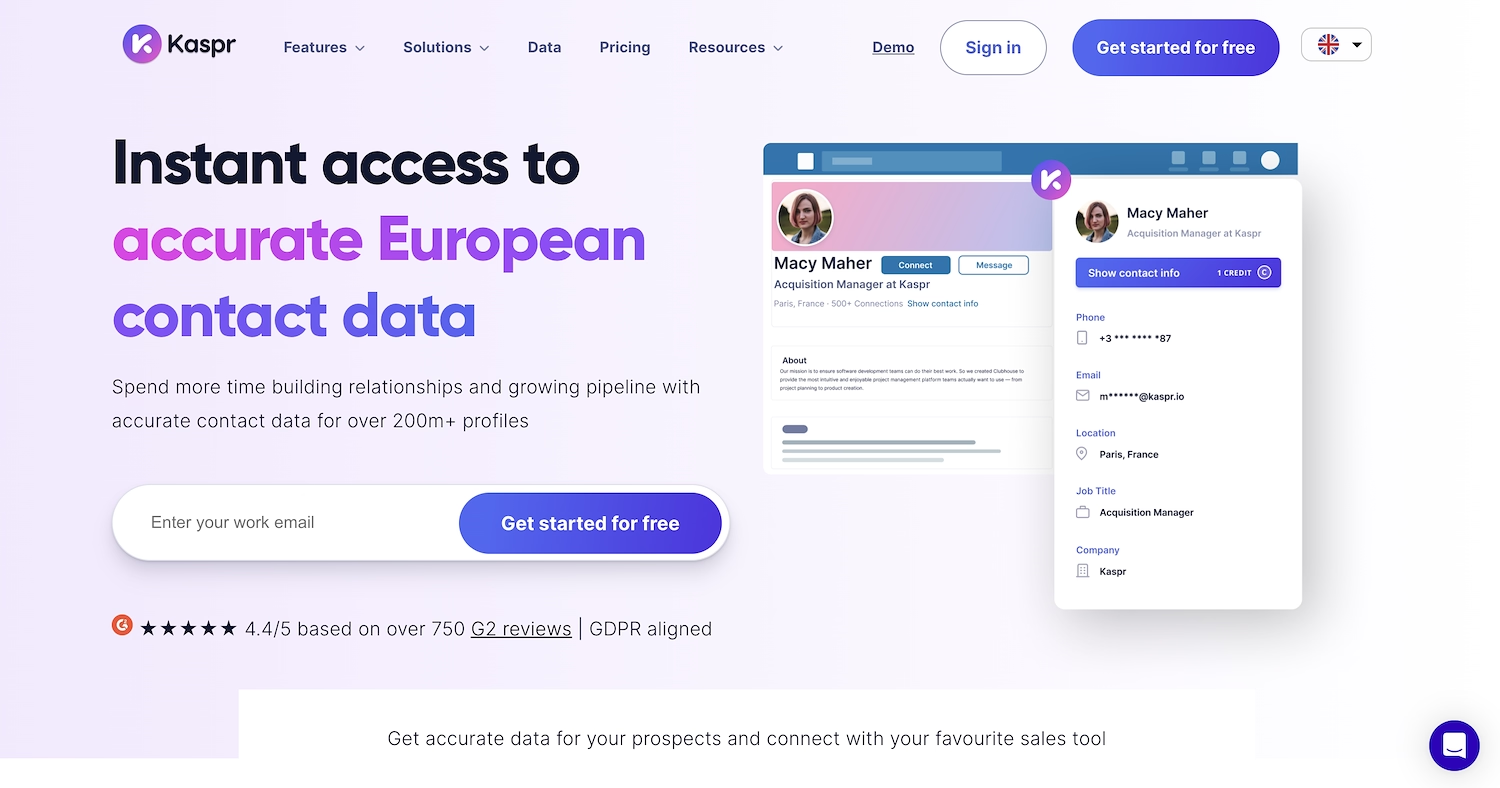
Kaspr is a prospecting tool that provides access to phone numbers and emails. Sales teams use its browser extension to find contact information on professional networks and build lists for outreach.
The service also enriches contact data and integrates with CRM platforms. This function helps keep sales information current and supports the outreach process.
Kaspr's Main Features
- Retrieves contact details automatically from LinkedIn using a Chrome extension.
- Manages prospects in a dashboard with data enrichment and LinkedIn outreach campaign creation.
- Integrates with various sales applications to sync prospect data.
- Provides access to unlimited B2B email addresses on its free plan.
How Kaspr Compares to Orbitly
Average Review score: 4.4/5 stars based on 825 G2 reviews.
- Kaspr uses a Chrome extension to find contact details directly on LinkedIn. This is different from Orbitly, which enriches data for contacts you already have.
- It allows users to create and manage LinkedIn outreach campaigns. This provides a sales engagement function that Orbitly does not have.
- The tool's free plan provides access to unlimited B2B email addresses. This offers a cost-effective way to gather emails, unlike Orbitly's model which focuses on enriching existing records.
- Kaspr includes a dashboard to manage prospects. This is a feature for organizing leads that is not part of Orbitly's core data enrichment service.
Potential Downsides of Using Kaspr
- Kaspr is designed for individual look-ups via its browser extension. Some users report that its bulk enrichment feature can fail, which makes it less suitable than Orbitly for enriching large contact lists at once.
- The tool focuses on finding email addresses and phone numbers. Compared to Orbitly, it might provide a more limited range of data points, as Orbitly specializes in appending a broader set of information to existing records.
- Its credit-based system can be a limitation for some teams. Users sometimes find the credits for phone numbers are costly or restrictive, whereas Orbitly's model may be more flexible for high-volume enrichment tasks.
Pricing and Cost Considerations
Kaspr offers a free plan and paid tiers starting at $49 per month. This subscription model can be more cost-effective than using Orbitly for data and paying for a separate outreach platform.
Which One Should You Go With?
Many variables factor into the selection of an Orbitly alternative. This guide shared several options to help you decide which tool fits your specific requirements and GTM motion.
If you want to automate sales functions, 11x provides AI agents for lead research, outreach, and CRM management. This approach combines multiple tools into one system, allowing your sales team to focus on closing deals instead of manual tasks.




